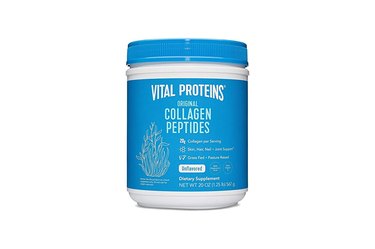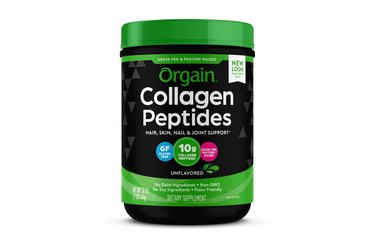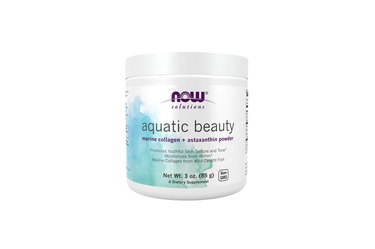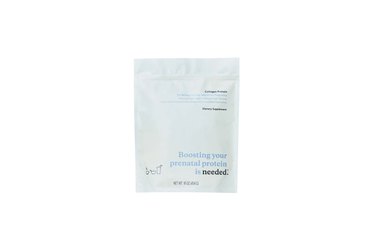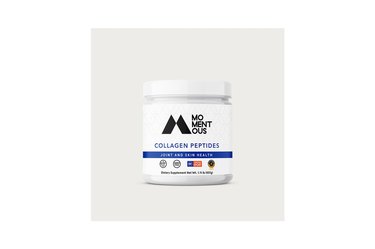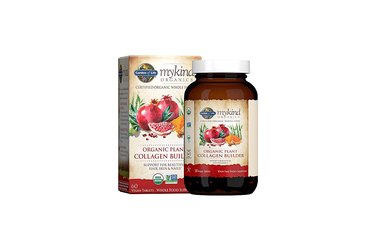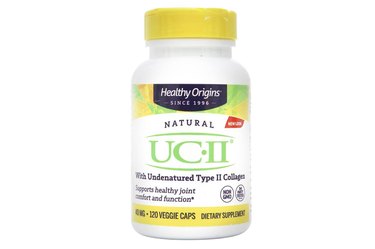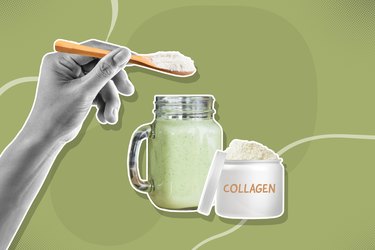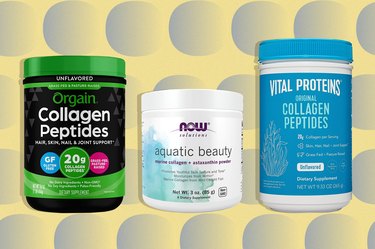
Collagen is the darling of the supplement world, and sales are surging. In fact, a January 2019 review in the Journal of Drugs in Dermatology estimated that collagen supplement sales will soar well over $6 billion by 2025. So you may be wondering: What's the craze all about?
Collagen is a protein that naturally occurs in our bodies, and its job, essentially, is to hold things together. Think of it like the scaffolding that provides structure for things like your skin, tendons and ligaments, to keep them from stretching and sagging.
Video of the Day
Video of the Day
It's no wonder, then, that we've come to think of collagen as key to a youthful complexion. But the protein is also essential when it comes to repairing damaged bones, cartilage and muscle as well as maintaining the mobility of our joints and connective tissues.
Collagen research is exploding and is working to catch up with the hype. "Although most of the current research is small-scale and short-term," registered dietitian Mackenzie Burgess, RDN, tells LIVESTRONG.com, "there are some promising potential benefits of using collagen peptides, such as improved joint health, reduced inflammation and increased skin elasticity."
Here, we've rounded up the best collagen supplements for specific health goals.
The Best Collagen Supplements
- Best Overall: Vital Proteins Collagen Peptides ($27.90, Amazon)
- Best on a Budget: Orgain Collagen Peptides ($19.66, Amazon)
- Best for Pescatarians: NOW Aquatic Beauty Powder ($16, Amazon)
- Best for Postpartum: Needed Collagen Protein ($49.99, ThisIsNeeded)
- Best for Athletes: Momentous Collagen Peptides ($51.95, LiveMomentous)
- Best for Vegans: Garden of Life mykind Organics Collagen Builder ($27.12, Amazon)
- Best for Joint Health: Healthy Origins Natural UC-II ($30.99, Amazon)
How We Chose
We polled several registered dietitians to see which collagen supplements they recommend to their clients and what they take themselves.
We also scrutinized each collagen supplement for the following:
- Brand adheres to current good manufacturing practices (CGMPs) mandated by the Food & Drug Administration (FDA)
- Third-party tested
- Low or no sugar or artificial flavors
- Beneficial additional ingredients
- Price
For more information on how we choose and cover products, click here.
Warning
Before adding any supplement to your diet, it is important to talk to your doctor about your individual medical needs. Collagen supplements are generally regarded as safe, but there are side effects, such as digestive issues, associated with them, so a supplement may not be the right choice for you. Additionally, people with dietary restrictions or food allergies should be cautious about which collagen supplement they take.
1. Best Overall: Vital Proteins Collagen Peptides
- Collagen per serving: 20 grams
- Protein per serving: 18 grams
Pros
- Sourced from grass-fed, pasture-raised cows
- Contains collagen types I and III for healthy skin, hair and nails
- NSF Certified for Sport
- Consumer Lab-approved
- Includes vitamin C and hyaluronic acid
Cons
- Does not contain collagen type II to support joint health
Vital Proteins' collagen gets the nod for best overall collagen supplement and is a dietitian favorite. Derived from grass-fed, pasture-raised cows, this protein comes in the form of a neutral-tasting powder and it is a solid choice for new and seasoned collagen consumers.
Registered dietitian Sarah Schlichter, RDN, CSSD, is a long-time fan: "I've always used Vital Proteins Unflavored Collagen Peptides, which is easy to add to liquids like coffee, smoothies and water, and even baked goods."
This collagen is NSF Certified for Sport and also gets a seal of approval from Consumer Lab.
"This product has no added sugar and also has hyaluronic acid, which can help boost collagen production in the body," adds registered dietitian Elysia Cartlidge, RDN. "The added vitamin C helps to enhance absorption of collagen to support hair, nail, skin and joint health."
2. Best on a Budget: Orgain Collagen Peptides
- Collagen per serving: 20 grams
- Protein per serving: 18 grams
Pros
- Sourced from grass-fed, pasture-raised cows
- Adheres to CGMPs
- Has type I and type III collagen to support healthy skin, hair and nails
- Collagen is the only ingredient; free of dairy and soy
- Relatively low-cost
Cons
- Does not contain type II collagen to support healthy joints
- Not third-party tested
Orgain Collagen Peptides is an inexpensive but high-quality collagen supplement. It is sourced from grass-fed and pasture-raised cows and only has one ingredient — collagen peptides. In other words, it doesn't have any extras that you don't want, like sugar or artificial flavors.
The lack of fillers makes it the choice of registered dietitian Moushumi Mukherjee, RDN: "I have always liked Orgain Collagen Peptides. It is dairy- and soy-free, so it has worked well with me and it works great to support my hair, nails and joints."
It also dissolves easily into hot and cold drinks. One serving provides 10 grams of both type I and type III collagen, and a month's supply typically rings up at nearly half the cost of some other options.
Orgain adheres to CGMPs for quality and purity.
3. Best for Pescatarians: NOW Aquatic Beauty Powder
- Collagen per serving: 2,000 milligrams (2 grams)
- Protein per serving: 2 grams
Pros
- Derived from fish
- Contains astaxanthin to support healthy skin
- Third-party tested and follows CGMPs
Cons
- Not a good source of protein
- Not a good source of type II collagen to support joint health
If you are a pescatarian, you should be looking for a collagen supplement that comes from fish and not cows, such as this one from NOW. NOW supplements are rigorously tested and do not have any common allergens — soy, gluten, dairy or eggs.
Amy Gorin, RDN, an inclusive, plant-based registered dietitian in Stamford, Connecticut, uses NOW Aquatic Beauty Powder to align with her pescatarian eating patterns: "Not only does it provide 2,000 milligrams hydrolyzed collagen (from fish skin) per half tablespoon serving, it also boasts 2 grams protein per serving, as well as more than 100 percent of the daily value for vitamin C. Plus, it has astaxanthin, which clinical studies have found to help skin maintain moisture and texture."
Buy it: Amazon ($16 for 27 servings); NOWfoods.com; ($22.39 for 27 servings)
4. Best for Postpartum: Needed Collagen Protein
- Collagen per serving: 15 grams
- Protein per serving: 14 grams
Pros
- Made from pasture-raised, grass-fed cows
- Third-party tested and follows CGMPs
- Good source of protein
- Safe during pregnancy and breastfeeding
Cons
- Pricey
It can be difficult to choose a supplement during pregnancy or while breastfeeding and know it's safe. With Needed's team of experts, you can feel confident you are getting a quality collagen supplement to support your needs. Needed manufactures in a CGMP facility and is third-party tested for purity and quality.
New mom and dietitian Jamie Adams, RDN, makes this her collagen of choice: "Needed's unflavored collagen protein has been my go-to brand to help heal pelvic floor tissues and support skin elasticity, joint health and postpartum hair regrowth. With 15 grams of pure grass-fed, pasture raised, hydrolyzed bovine collagen per serving, adding one scoop to my morning smoothie, oatmeal, coffee or tea helps meet increased protein needs for postpartum healing."
She adds: "It's dairy- and soy-free, too, without any additives — a great brand for [breastfeeding] moms of babies with food allergies."
Buy it: ThisIsNeeded.com ($49.99 for 30 servings, or $42.49 when you subscribe)
5. Best for Athletes: Momentous Collagen Peptides
- Collagen per serving: 11.6 grams
- Protein per serving: 15 grams
Pros
- Derived from grass-fed, pasture-raised bovine
- NSF Certified for Sport
- Good source of protein
Cons
- Pricey
- Needs to be taken an hour before exercise
When it comes to supplementing as an athlete, there's no messing around. You can't take the chance that your supplement is tainted with any illegal or banned substances. Momentous Collagen Peptides are NSF Certified for Sport, which is the gold standard for third-party testing in supplements for athletes. (Bottom line: If you are an athlete and it doesn't have an NSF Certified for Sport label on it, put it back on the shelf.)
This supplement delivers 15 total grams of protein from two different sources of collagen, plus vitamin C, which helps your body use the collagen. You're paying a little extra for that certification, but peace of mind is worth it.
Buy it: LiveMomentous.com ($51.95 for a 30-day supply, or $44.16 when you subscribe); Amazon ($49.35 for a 30-day supply)
6. Best for Vegans: Garden of Life mykind Organics Collagen Builder
- Collagen per serving: 0 grams
- Protein per serving: Less than 1 gram
Pros
- Safe for vegans and vegetarians
- Good source of biotin and vitamins A and C
- USDA Organic
- NSF Certified for Sport
- Certified vegan and gluten-free
Cons
- Doesn't have collagen
- Not a good source of protein
This is a popular choice for those following a vegan diet. Because collagen is an animal-derived protein, vegan supplements don't actually include it. Rather, they focus on the nutrients that help build the protein in the body (hence the term "builder" in the name).
This pick is made from organic plant and tea extracts but is also rich in vitamin A and vitamin C, both of which help promote collagen formation.
This supplement also has a good amount of biotin. According to the Harvard T.H. Chan School of Public Health, biotin supplements may help improve the health of hair and nails, although research has so far been limited in this area.
Buy it: Amazon; Price: $27.12 for a 30-day supply
7. Best for Joint Health: Healthy Origins Natural UC-II
- Collagen per serving: 10 milligrams
- Protein per serving: Less than 1 gram
Pros
- Consumer Lab-approved
- Easy to take for people who prefer capsules over powder
Cons
- Has some filler ingredients
- Not a good source of protein
Healthy Origins Natural UC-II outshines the competition as Consumer Lab's top pick for joint pain. One single capsule of the supplement provides 10 mg of UC-II collagen. So, no powders to mix or elixirs to drink.
It is worth noting that it can take up to three months to start to see results when it comes to joint relief.
In a study that lasted six months, researchers looked to UC-II collagen versus placebo and glucosamine chondroitin to see if symptoms of knee osteoarthritis would lessen. In 164 subjects, those who took UC-II collagen had significant reductions in pain and stiffness as well as improved physical function, according to January 2016 results in Nutrition Journal.
What to Look for in a Collagen Supplement
If you want to add a collagen supplement to your diet, there are many to choose from. Here are a few things to consider when you're looking for a quality supplement:
1. Collagen Sources
Collagen is abundant in many animal food sources, including beef, chicken, pork, fish and bone broth. "When it comes to protein supplements such as collagen, we first consider food sources," says Rachel Fine, RDN, a registered dietitian and owner of To the Pointe Nutrition in New York City.
Like any protein, collagen is made up of building blocks called amino acids. When we take collagen, our body breaks it down into amino acids such as lysine, methionine, glycine and proline. These acids may then be re-combined to make collagen, if the body needs it, or they may combine with other molecules to create a variety of compounds with different purposes.
Glycine, for example, is used to synthesize creatine, an organic acid that helps provide your muscles with the fuel they need to power through a workout. Lysine and methionine, on the other hand, can be used to make keratin, which supports strong, shiny hair. Which compounds get made depends on what the body needs most at any given time.
2. Collagen Types
There are many types of collagen, per the Cleveland Clinic, but three are primarily found in supplements:
- Type I: Supports skin, bone, tendons and ligaments
- Type II: Found in elastic cartilage, which supports joints
- Type III: Found in muscles, arteries and organs
Types I and III are thought to support healthy skin, hair and nails, while type II is mainly thought to support good joint health.
3. Third-Party Testing
Supplements like collagen aren't closely regulated by the FDA. One concern with collagen specifically is the possibility of heavy metal contamination, as lead and cadmium can accumulate in the bones and tissues of animals. If your supplement has been third-party tested, though, it has gone through a heavy metals check as well as other tests to make sure it has the amount stated on the label and will break down properly in your body.
High-quality supplement companies choose to have their products verified through a third party such as USP, NSF International or Consumer Lab.
The FDA also sets Good Manufacturing Practices (GMP) for companies, which lay out standards of purity and quality in dietary supplements. Manufacturers will often list their products' verifications on their respective websites, and they will also note if a product adheres to the GMP standards. Some brands choose to add this information to their product labels.
4. Fillers
Look for a supplement with as few ingredients as possible. The main (and ideally the only) ingredient should be collagen, with no preservatives or added sugar. The reason: You'll get more of what you want from your supplement and less (or no) fillers that you don't need.
The Cleveland Clinic stresses that collagen powder should be flavorless, colorless and should dissolve easily in liquid. These qualities make it more likely that no extra ingredients were added to the supplement.
5. Dose
Most collagen comes in a powdered form, which makes it easy to mix into drinks, smoothies or even add to your favorite muffin recipe. For most powdered collagen peptides, the dose will be around 10 to 20 grams of collagen. This is appropriate for a powder.
You will also see capsules and gummy forms of collagen. These can be made from different type of collagen. For example, UC-II collagen is usually dosed out at 10 milligrams per day, according to the experts at Consumer Lab.
Typically, gummies have a much lower amount of collagen than powders. Consumer Lab notes that gummies are difficult to manufacture because of the formulations and the nutrients tend to degrade over time, so it's just something to remember when choosing a gummy supplement — always check to see if it's been tested and approved.
- Journal of Drugs in Dermatology: "Oral Collagen Supplementation: A Systematic Review of Dermatological Applications"
- National Center for Biotechnology Information: "Biochemistry, Collagen Synthesis"
- Nutrition Journal: "Efficacy and tolerability of an undenatured type II collagen supplement in modulating knee osteoarthritis symptoms: a multicenter randomized, double-blind, placebo-controlled study"
- Dermato Endocrinology: "Skin anti-aging strategies"
- Cleveland Clinic: "The Best Way You Can Get More Collagen"
- PubChem: "L-Proline"
- Consumer Labs:"Review of Collagen Supplements"
- Nutrients: "Roles of Vitamin C in Skin Health"
- Cleveland Clinic: "Collagen"
- Harvard T.H. Chan School of Public Health: "Biotin - Vitamin 7"
